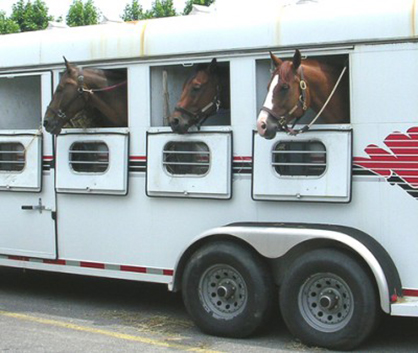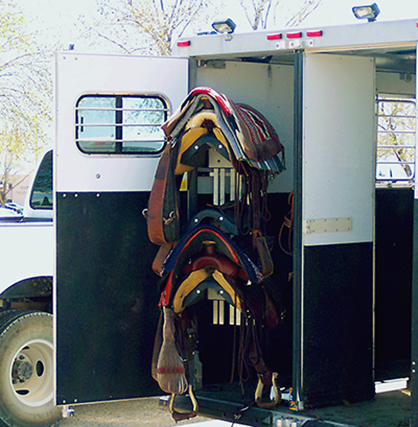Basic Horse Trailer Safety Tips
 By: Taylor Fabus, Michigan State University Extension, and Warren Van Overbeke, MSU
By: Taylor Fabus, Michigan State University Extension, and Warren Van Overbeke, MSU
Have you ever just backed up to your horse trailer, attached it to your truck, loaded your horses, and drove on down the road without another thought? Well, I hate to admit it, but I have.
Time and experience have taught me that is not the best course of action. Sure, it’s easiest to just hook up your rig and head down the road. Who wants to take the time to check the tires, look at the frame and floorboards, make sure the hitch operates correctly, the lights work, and the doors latch the way they should? Although that seems like a daunting list of things to maintain, if you slow down just a bit, you can allow yourself the opportunity to more regularly check these important issues without much inconvenience or time spent.
Regular preventative maintenance for your trailer should be a part of a monthly or prior-to-use routine. Trailers, just like vehicles, are prone to breakdown. Consistent use and extended lack of use can cause a trailer to need repair. It is the operator’s responsibility to ensure the trailer is roadworthy.
The Equestrian Group, an insurance agency who insure us when stuff goes really wrong, recommends regular and annual maintenance checks and have assembled the following checklist in an effort to keep us on the road and out of trouble. Regular maintenance consists of the following. This check should occur each time before you tow.
Tires and wheels
- Check the tire pressures and thread depth.
- Check the condition of the tires. Include the rear tires of the towing vehicle in your inspection.
- Make sure you are carrying a spare tire that is roadworthy.
- Make sure lug nuts are tight on all wheels.
Floorboards
- Check the floorboards for any rot or general weakness.
- Ensure drainage holes are unblocked in order to lengthen the life of a trailer floor. Lift the rubber mats after use and sweep or hose out the floor. Make sure the floor is completely dry before replacing any mats as this may cause rotting.
Inside the trailer
- Check carefully for any loose or protruding screws bolts and nails inside the trailer.
- Look for bees or wasps or any other undesired animals that need to be removed.
- Check the partitions and all locks and bolts.
Outside the trailer
- Safety chains: Make sure chains are crossed and hooked to vehicle frame—not the bumper.
- Hitch: Look for loose bolts, hairline cracks and other signs of wear. Check for proper hookup. (In conventional trailers, the socket should be seated on the ball and locked in place.)
- Check that all lights are in full working order including the marker, tail, brake, indicator and interior lights.
- Check that jacks and safety triangles or reflectors are in good working order in case of a breakdown.
 Annual maintenance checks can be just as, if not more, important as regular maintenance checks. Annual checks go further in-depth and look for items you may not easily see. The following is a list of annual maintenance checks provided by the Equestrian Group.
Annual maintenance checks can be just as, if not more, important as regular maintenance checks. Annual checks go further in-depth and look for items you may not easily see. The following is a list of annual maintenance checks provided by the Equestrian Group.
Annual maintenance checks
- Check the brake pads and brake discs for wear and adjust or replace as necessary. Do this on your truck as well as your trailer.
- Inspect the frame of the trailer for cracks.
- Inspect all wires for loose connections or frayed coverings.
- Repair or replace any rotted or rusted metal.
- Grease all hinges, springs, ball hitch, etc.
- Check the trailer ramp (if you have one) and its hinges for any weaknesses or cracks.
- Wheels should be pulled and bearings checked and, if necessary, repacked.
- Check the floor for any rotting or major weakness, which may need repairing. If it is an aluminum floor, check for any large dents or corrosion.
- Check all the internal and external lights
Note: If at any time you are unsure of the trailer’s condition or how to make a repair, seek the assistance of a trained mechanic in your area.
In the end, a little extra attention to your trailer, yearly and prior to departing home, may be the difference between a great day of riding the trails and an unfortunate day sitting on the side of the interstate. These things happen, but with good preventative maintenance you will be prepared for nearly anything the road may throw your way.
Be sure to check out this Michigan State University Extension article, “Take steps to travel safely with your equines.”
This article was published by Michigan State University Extension. For more information, visit http://www.msue.msu.edu. To have a digest of information delivered straight to your email inbox, visit http://www.msue.msu.edu/newsletters. To contact an expert in your area, visit http://expert.msue.msu.edu, or call 888-MSUE4MI (888-678-3464).










